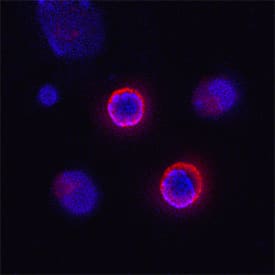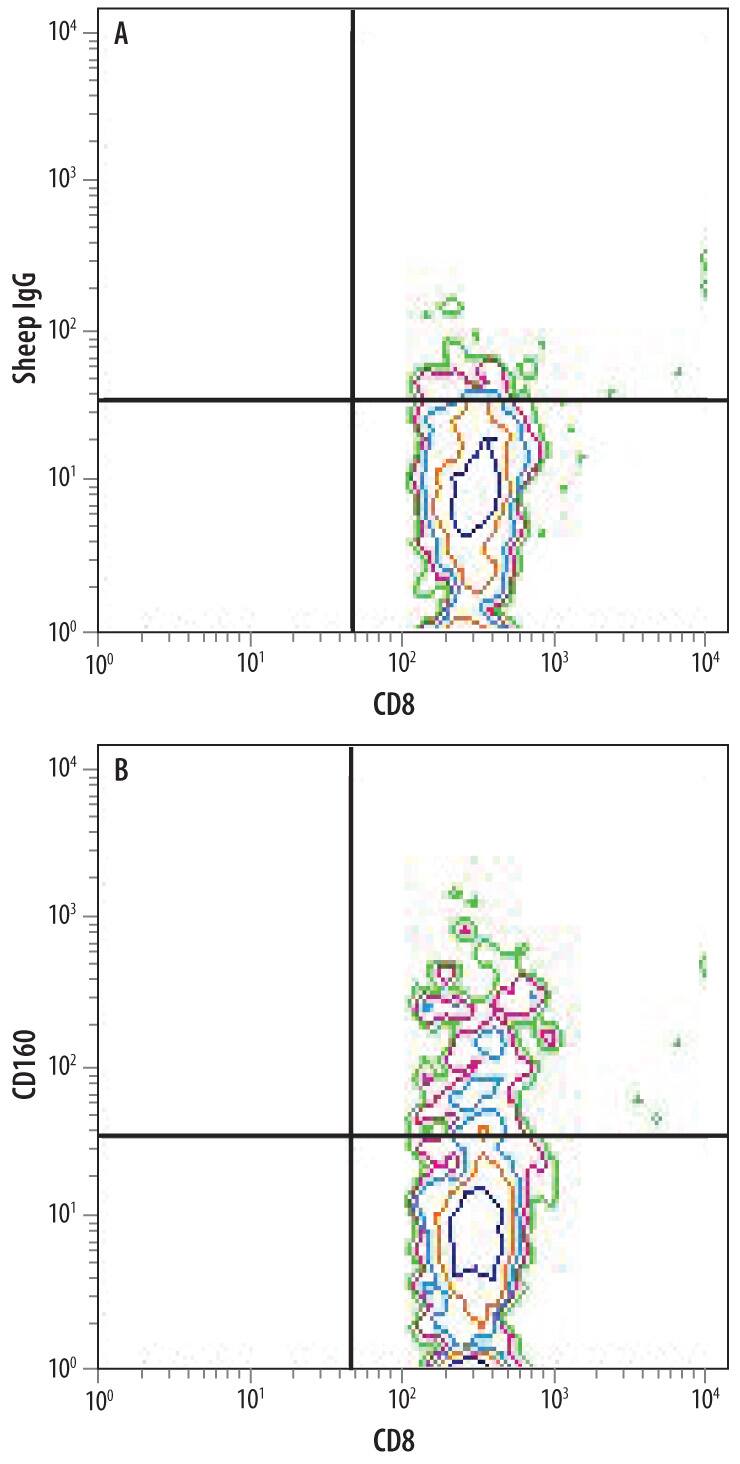Mouse CD160 Antibody
R&D Systems, part of Bio-Techne | Catalog # AF3899

Key Product Details
Species Reactivity
Applications
Label
Antibody Source
Product Specifications
Immunogen
Gly28-Ser160
Accession # AAH21596
Specificity
Clonality
Host
Isotype
Scientific Data Images for Mouse CD160 Antibody
Detection of CD160 in Mouse Splenocytes by Flow Cytometry.
Mouse splenocytes (CD8-gated) stimulated with LPS for 3 hours were stained with Sheep Anti-Mouse CD160 Antigen Affinity-purified Polyclonal Antibody (Catalog # AF3899) followed by Phycoerythrin-conjugated Anti-Sheep IgG Secondary Antibody (Catalog # F0126) and Rat Anti-Mouse CD8a APC-conjugated Monoclonal Antibody (Catalog # FAB116A). Quadrant markers were set based on control antibody staining (Catalog # 5-001-A).CD160 in Mouse Splenocytes.
CD160 was detected in immersion fixed mouse CD8+ splenocytes using Sheep Anti-Mouse CD160 Antigen Affinity-purified Polyclonal Antibody (Catalog # AF3899) at 15 µg/mL for 3 hours at room temperature. Cells were stained using the NorthernLights™ 557-conjugated Anti-Sheep IgG Secondary Antibody (red; Catalog # NL010) and counterstained with DAPI (blue). Specific staining was localized to plasma membranes. View our protocol for Fluorescent ICC Staining of Non-adherent Cells.Applications for Mouse CD160 Antibody
CyTOF-ready
Flow Cytometry
Sample: Mouse splenocytes stimulated with LPS
Immunocytochemistry
Sample: Immersion fixed mouse CD8+ splenocytes
Formulation, Preparation, and Storage
Purification
Reconstitution
Formulation
Shipping
Stability & Storage
- 12 months from date of receipt, -20 to -70 °C as supplied.
- 1 month, 2 to 8 °C under sterile conditions after reconstitution.
- 6 months, -20 to -70 °C under sterile conditions after reconstitution.
Background: CD160
‑CD160 (also Natural killer cell receptor BY55) is a 16 kDa (predicted) member of the Ig superfamily (1 ‑ 4). In mouse, it is expressed principally on nonmyeloid hematopoietic cells. These include CD3+ NK1.1 cells, CD8+ TEM and TCM T cells, CD8 alpha+ IELs, NKT cells, CD8-gamma delta TCR T cells, and vascular endothelial cells (1, 5‑7). Mouse CD160 has been identified as a 20-21 kDa GPI-linked glycoprotein (4, 5). It is synthesized as a preproprotein that is 185 amino acids (aa) in length. The precursor contains a 27 aa signal sequence, a 133 aa mature molecule that shows one 98 aa V-type Ig-like domain (aa 28-125), and a 25 aa prosegment that is cleaved to generate a GPI-linkage at Ser160. Mouse GPI-linked CD160 is known to be cleaved by phospholipase C, and this generates a 40 kDa (presumably dimeric) band in SDS-PAGE (5). One alternative splice form for mouse CD160 is reported that appears to show a deletion of aa 137-180. This may generate a soluble molecule (5; GenBank Accession # NP_001156969). Mature mouse CD160 shares 63% and 88% aa identity with human and rat CD160, respectively.
In mouse, CD160 is reported to bind to bind to HVEM/TNFRSF14, and both classical and non‑classical MHC Class I molecules (5, 8). MHC‑I proteins recognized by CD160 include Dd, Kb, Qa-1b and CD1d (5). Upon engagement, the effects of CD160 ligation appear to be context dependent. When expressed on endothelial cells, CD160 binding to human HLA-G1 initiates apoptosis, and thus impacts angiogenesis (6). When expressed on NK1.1 cells, mouse CD160 ligation alone has no effect; when combined with NK1.1 antigen stimulation, CD160 decreases NK cell IFN-gamma secretion. Relative to cytotoxicity, NK cell activity is positively correlated with the presence of CD160 (5).
References
- Cai, G. & G.J. Freeman (2009) Immunol. Rev. 229:244.
- del Rio, M.L. et al. (2010) J. Leukoc. Biol. 87:223.
- Maiza, H. et al. (1993) J. Exp. Med. 178:1121.
- Anumanthan, A. et al. (1998) J. Immunol. 161:2780.
- Maeda, M. et al. (2005) J. Immunol. 175:4426.
- Fons, P. et al. (2006) Blood 108:2608.
- Tsujimura, K. et al. (2006) Immunol. Lett. 48:106.
- Cheung, T.C. et al. (2009) Proc. Natl. Acad. Sci USA 106:6244.
Alternate Names
Gene Symbol
UniProt
Additional CD160 Products
Product Documents for Mouse CD160 Antibody
Product Specific Notices for Mouse CD160 Antibody
For research use only

